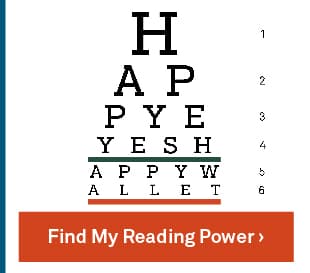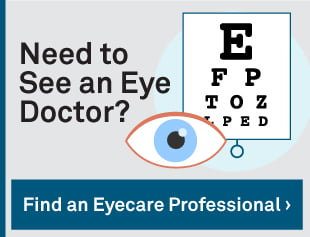By Meredith Marmurek
Reviewed by Thomas Stokkermans, OD, PhD on July 27, 2023
If cataract surgery is in your future, you may be wondering what your vision will be like afterward. For example, if you wear reading glasses now, will you need them after surgery?
The answer depends on what type of intraocular lens (IOL) you have implanted in your eyes when the natural lenses with cataracts are removed. We spoke with Dr. Thomas Stokkermans, OD, PhD, to learn more.
Which Reading Glasses Do You Need?
Reading glasses range in power (the amount of magnification) from +1.00 to +7.00. The higher the number, the closer the lenses will focus and allow you to see near objects better.
After cataract surgery, many people find reading glasses with +2.00 power are strong enough to give them clear near vision when reading. If +2.00 readers don’t work for you, there are online tools — including our printable diopter chart — that you can use to determine the power you need or you may need to visit your eye doctor.
If you’re between two powers, try the glasses with the lower power first.
Intraocular Lenses
Like prescription glasses and contact lenses, intraocular lens implants come in different focusing powers. You’ll most likely need readers if you get any of the following IOLs, but you should always talk to your eye doctor if you have any questions about your vision:
Monofocal
A monofocal IOL is used in the majority of cataract surgeries. This type of IOL can give you clear vision at one distance — close up, mid-range, or far away. Most people choose to be able to see clearly at a distance. Corrected distance vision can help with activities like driving. If you choose distance vision, you may need reading glasses for close-up activities.
Monovision
Monofocal IOLs can also be adjusted to help you focus up close and at a distance. This is called monovision and is done when one eye is set for distance and the other is set for close. This is a common solution to avoid the need for more expensive multifocal IOLs.
The eyes each end up having their own specialized use — one for distance and one for near — and this can be hard to get used to. Because of this, people with monovision IOLs may still need reading glasses.
Extended Depth-of-Focus (EDOF)
This lens helps you see things clearly at mid-range, like working on a computer, and far away. You may still need to wear reading glasses for clear near vision.
Light-Adjustable Lenses (LAL)
With LALs, your eye doctor customizes the corrective power in your LALs after surgery to provide you with the vision you want (or close to it). These lenses are monofocal so you may still need reading glasses.
Accommodative
This IOL works like a healthy eye’s natural lens and changes shape so you can see clearly at all distances. You most likely won’t need glasses or contact lenses after cataract surgery with accommodative IOLs. However, you may choose to wear reading glasses if you’re going to read or do close-up work for an extended period of time.
Toric
A toric IOL is for cataract patients with astigmatism. Similar to an accommodative lens, a toric lens moves and changes shape like a natural lens. While you probably won’t need reading glasses with a toric IOL, you may find they can help if you need clear near vision for long periods of time.
Multifocal
This type of intraocular lens has many focal zones to provide clear vision up close and far away. You may need time to get used to a multifocal lens.
When Should You Get Reading Glasses?
Everyone’s recovery will be different, and your eye surgeon will give you instructions about your eye care following your cataract surgery. Your vision should stabilize about two weeks after surgery, but it can take longer for you to fully recover. You can get reading glasses if you notice that you can’t see clearly up close on your own.
We have a wide variety of reading glasses for men and for women in different powers, frame sizes, shapes, and colors to help you find the pair that’s right for you.
SOURCES
- Monovision cataract surgery: Description and benefits. All About Vision. September 2021.
- Accommodating intraocular lenses (IOL) for cataract surgery. All About Vision. February 2019.
- IOLs: Choosing the best implant for cataract surgery. All About Vision. February 2019.
*All About Vision and AAV Media, LLC are affiliates of EssilorLuxottica





0 Comments